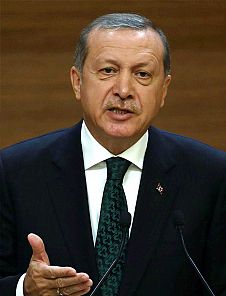His Excellency Recep Tayyip Erdoğan has dominated Turkish politics for over two decades, progressing from mayor of Istanbul (1994–1998) to Prime Minister (2003–2014) and President since August 2014.
Birth: 26 February 1954 (Age: 71)
Source of Influence: Political
Influence: President of 86 million Turkish citizens
School of Thought: Sunni, Traditional Sunni
Status: Featured in current year
His Excellency Recep Tayyip Erdoğan has dominated Turkish politics for over two decades, progressing from mayor of Istanbul (1994–1998) to Prime Minister (2003–2014) and President since August 2014.
Elections: Leading the Justice and Development Party (AKP) since 2001, Erdoğan secured three consecutive prime ministerial victories with majorities in 2002, 2007, and 2011, ushering in unprecedented economic growth, infrastructure booms, and constitutional reforms. As Türkiye’s first popularly elected president, he won in 2014 (52%), 2018 (52.6%), and a 2023 runoff. His unyielding advocacy for Muslim causes—from Uyghurs to Rohingya—has cemented global admiration among Muslims, positioning Türkiye as a powerhouse bridging East and West.
Challenges: The March 2024 local elections delivered a stinging rebuke: the opposition CHP captured 37.8% nationally, seizing Istanbul (Ekrem İmamoğlu, 51%) and Ankara (Mansur Yavaş), relegating AKP to second place at 35.5%—its worst since 2001—amid voter fury over inflation and authoritarianism. “Erdonomics”—Erdoğan’s low-interest-rate dogma—depreciated the lira over 400% against the USD since 2008, fuelling 2022’s 85% inflation peak. The adoption of Mehmet Şimşek’s orthodox policies since 2023 have attracted $15 billion in foreign investment.
Failed Coup Ramifications: The ramifications of the failed coup of 15 July 2016, which led to about 200 deaths, still continue. Erdoğan squarely laid the blame of orchestrating the coup on the late Fethullah Gülen, and has led an all-out attack on Gülen’s organisations and supporters. There has been a major crackdown on many sectors with about 300,000 civil servants being dismissed in various state institutions, with over half from the education sector. Also, 50,000 people remain in detention with this number continually rising as authorities press ahead with regular raids.
Between the US and Russia: Relations between Türkiye and the United States remain tense following Ankara’s 2019 acquisition of Russia’s S-400 air defense system. This decision led to Türkiye’s suspension from the F-35 fighter jet program and sanctions targeting its defence industry. Türkiye has condemned the Russian invasion of Ukraine, but avoided sweeping sanctions on Moscow. At the same time, it hosted key Russia-Ukraine peace talks in Istanbul in May 2025 and brokered several prisoner exchanges, strengthening its diplomatic role.
Role in Syria: Erdoğan has been a central player in the Syrian conflict since 2011, initially backing opposition forces against Bashar al-Assad. Turkish forces now maintain control over parts of northern Syria to counter both ISIS remnants and Kurdish militias linked to the PKK. Erdoğan has also facilitated millions of Syrian refugees inside Türkiye, though domestic debate over their future is intensifying.
Cultural Power: In July 2020, Erdoğan restored Hagia Sophia as a mosque—reversing Atatürk’s 1934 secular designation—an act widely celebrated in the Muslim world. In 2022, the United Nations formally recognised Türkiye’s preferred name (pronounced tur-key-YAY), aligning international usage with its official identity since independence in 1923. Türkiye’s global influence has also been amplified by its television and film industry. In 2024 the Turkish TV-series sector exported over 300 productions to nearly 200 countries, reaching close to one billion unique viewers annually. Diriliş: Ertuğrul, Muhteşem Yüzyıl (The Magnificent Century), and Payitaht: Abdülhamid are among the historical dramas especially popular, with Diriliş: Ertuğrul boasting over 3 billion views globally.
The Gaza Genocide: Erdoğan has likened Israeli Prime Minister Netanyahu to Hitler and framed Türkiye as a defender of Palestinian rights, halting $7 billion in annual trade with Israel in May 2024, closing airspace to Israeli flights in August 2025, and banning Israeli vessels from Turkish ports. However, there is criticism of loopholes through Greece and Azerbaijan allowing trade with Israel, and the role of NATO radar base at Kürecik.
“If we look at history, we will see that regimes which persecute [their people] do not remain standing.”
Over 60 Million tourists in 2023
$30Billion Incentive program for hightech and green investments
News about Recep Tayyip Erdogan
- No approved news items yet.



